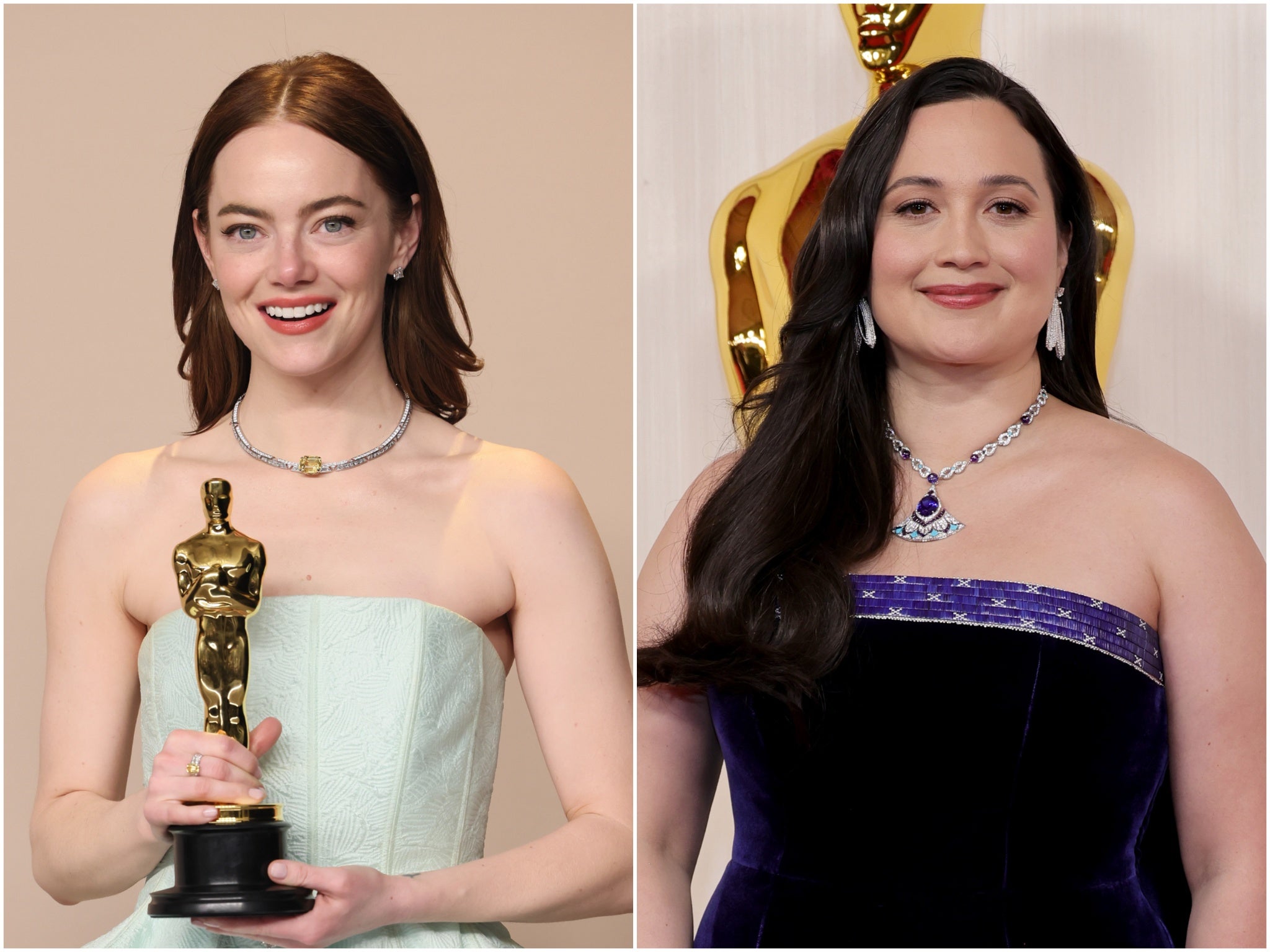Emma Stone’s Best Actress Oscar win over Lily Gladstone doesn’t feel right – and Stone herself seems to know it
The ‘Poor Things’ star’s performance in Yorgos Lanthimos’s film is truly joyous. But, writes Clarisse Loughrey, her triumph poses questions about what art we choose to celebrate in a fractured world


Your support helps us to tell the story
From reproductive rights to climate change to Big Tech, The Independent is on the ground when the story is developing. Whether it's investigating the financials of Elon Musk's pro-Trump PAC or producing our latest documentary, 'The A Word', which shines a light on the American women fighting for reproductive rights, we know how important it is to parse out the facts from the messaging.
At such a critical moment in US history, we need reporters on the ground. Your donation allows us to keep sending journalists to speak to both sides of the story.
The Independent is trusted by Americans across the entire political spectrum. And unlike many other quality news outlets, we choose not to lock Americans out of our reporting and analysis with paywalls. We believe quality journalism should be available to everyone, paid for by those who can afford it.
Your support makes all the difference.Emma Stone’s wild-eyed look, as she clambered up on stage to receive the Oscar for Best Actress, said it all: she didn’t think she was going to win. Perhaps, even, she wasn’t quite sure she was meant to win. Her turn as Bella Baxter in Yorgos Lanthimos’s Poor Things, about a reanimated woman with a baby’s brain who rediscovers the world step by step, sensation by sensation, is truly joyous. She offers us Bella’s curiosity, her fierce intellect, her unsteady limbs, her wildfire emotions – all without ever demeaning or infantilising her. She’s a fabulistic creation, given flesh-and-blood relatability through Stone’s contributions.
And, yet, for many, the win didn’t quite feel right. And it seemed as if Stone might be inclined to agree. Her speech rushed towards the words: “Lily, I share this with you. I’m in awe of you.” For much of the lead-up to awards season, the conversation had centred around Martin Scorsese’s tale of Indigenous slaughter, Killers of the Flower Moon, and Lily Gladstone’s turn as Mollie Burkhart. Mollie was a survivor of the Reign of Terror in the early 20th century, in which dozens of people belonging to the Osage Nation were murdered for their share of inherited oil rights by white co-conspirators who had married into their families.
Gladstone’s performance is singular, the most striking presence created by a female actor in any of Scorsese’s substantial back catalogue. Mollie’s story is one of loss, of the wrenching terror of witnessing her family, her culture, and her home be systematically annihilated.
But it’s a feeling complicated, too, by the love she bears – both sincere and as the product of manipulation – for her husband Ernest (Leonardo DiCaprio). She’s fully conscious that she’s being led, by a lover’s hand, towards her own destruction – set on a path from which she’s powerless to turn away. Gladstone communicates so much of this in silence, in a penetrating, defiant stare that looks out to us and demands that we witness her; or in the smallest curl of her smile as she laughs at Ernest and calls him “coyote”, the scavenger greedily feeding on scraps.
As healthy as it is to resist media-friendly Oscar narratives about who’s earned their place, and who’s toiled the most, the Best Actress race this year (which also included Sandra Hüller’s uncompromising turn as a murder suspect in Anatomy of a Fall) throws up several questions about what kind of art we choose to celebrate. Stone’s performance is, arguably, the best of her career. But this is also her second win, and Bella Baxter relies on much of the same bravado and energy we’ve already seen in The Favourite, La La Land, or (for the TV fans) The Curse.
Gladstone, meanwhile, is the definition of revelatory. She’s always stood out, but here she’s finally been given the platform to show us how far the boundaries of her talent stretch. As the night’s tepid host Jimmy Kimmel mentioned during the ceremony, the actor had been close to quitting the business for good, despite notable turns in Kelly Reichardt’s Certain Women and First Cow, when Scorsese sought her out. And, now, suddenly, she’s one of the very few Indigenous actors to ever be nominated for an Academy award.

It was too close a race to confidently call this a shock or a snub, but the absence of a Gladstone win stings all the more when coupled with a general lack of recognition for Killers of the Flower Moon. Scorsese’s masterful work was barely mentioned beyond Kimmel’s tasteless joke that it was “so long you could drive to Oklahoma and solve the murders yourself”. And, despite it overall being a strong year for nominees, all of this sits a little uneasily for a ceremony in which the hollowness of Hollywood’s self-aggrandisement has never felt more apparent.
Oppenheimer’s Robert Downey Jr, while accepting his Oscar for Best Supporting Actor, declared: “What we do is meaningful, and the stuff that we decide to make is important.” But how can that be true when the same industry ignores the reality that lies just beyond the auditorium doors? The ceremony was delayed by several minutes due to a large pro-Palestine protest that took place outside. Yet, one of the only people to pierce the bubble of near-total, apolitical silence during the evening was The Zone of Interest’s director Jonathan Glazer, who said, while accepting the award for Best International Film: “All our choices were made to reflect and confront us in the present: not to say ‘Look what they did then’ – rather, ‘Look what we do now.’”
Glazer’s film – a portrait of the commandant of Auschwitz, Rudolf Höss, and his family – won both Best International Film and (in an inspired move) Best Sound. Its legacy, in all likeliness, will far outlive the night’s ceremony. It’s a difficult film, which asks direct, confrontational questions in a way that stands in stark contrast to the mighty, but more existential, Best Picture winner Oppenheimer (which predictably swept the awards). The Zone of Interest shares a good amount of DNA not only with Killers of the Flower Moon, but specifically with Gladstone’s performance and the way in which she engages directly with the viewer. Stone’s win is a commendable one, but for a night that tested art’s true value in a fractured world – well, even Stone might agree that the right choice seemed self-explanatory.
Join our commenting forum
Join thought-provoking conversations, follow other Independent readers and see their replies
Comments